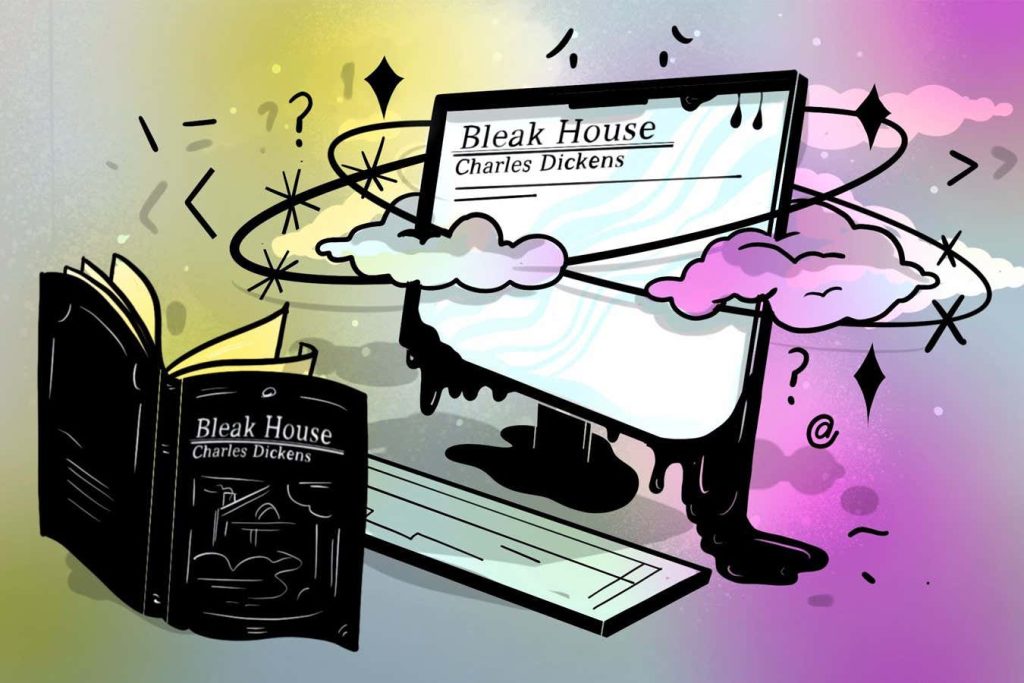
Feedback is New Scientist’s popular sideways look at the latest science and technology news. You can submit items you believe may amuse readers to Feedback by emailing feedback@newscientist.com
Bleaker house
One of the great joys in life, Feedback argues, is the perfect opening sentence of a book – and the concomitant realisation that, yes, this one is going to be good. “It was the day my grandmother exploded.” “As the manager of the Performance sits before the curtain on the boards and looks into the Fair, a feeling of profound melancholy comes over him in his survey of the bustling place.” “Let’s start with the end of the world, why don’t we?”
So we, and many others, were horrified by a passage in a recent article in The New Yorker about how artificial intelligence might change reading. The suggestion was that AI might simplify challenging prose into something less tangled.
The example offered by writer Joshua Rothman was this line from the “muddy and semantically tortuous” opening of Charles Dickens’s Bleak House: “Gas looming through the fog in divers places in the streets, much as the sun may, from the spongey fields, be seen to loom by husbandman and ploughboy.” The AI Claude reworks it thus: “Gas lamps glow dimly through the fog at various spots throughout the streets, much like how the sun might appear to farmers working in misty fields.”
This was flagged by Tobias Wilson-Bates, an associate professor of 19th-century British literature, on Bluesky, where he said: “This article is going to turn me into the Joker.”
We suppose that, on some level, Claude has managed to convey something of what Dickens was getting at, but we also suppose that things like cadence and scansion are relevant to the reading experience. The phrase “various spots” physically hurt when we read it. We also aren’t sure that the passage’s sole purpose is to convey that things are a bit foggy. Everyone in Bleak House is threatened and stymied, and words like “loom” and “spongey” set this mood.
But never mind literary criticism when we can amuse ourselves. What other dense prose passages could be summarised by AI for ease of consumption? Adam Sharp has already made some suggestions, again on Bluesky. For instance, take the opening line of Sylvia Plath’s novel The Bell Jar: “It was a queer, sultry summer, the summer they electrocuted the Rosenbergs, and I didn’t know what I was doing in New York.” Sharp suggests the following abridgement: “That summer was sizzling, and so were the Rosenbergs.”
And what about that overly long opener from Jane Austen’s Pride and Prejudice: “It is a truth universally acknowledged, that a single man in possession of a good fortune, must be in want of a wife.” Surely we can boil that down a bit: “Everyone knows that rich, single men want to get married.” We encourage readers to identify similar prosey passages in need of AI-assisted simplification.
Burn before viewing
Brian Darvell recently obtained a DVD of the film Conclave and was thrown into theological confusion by a yellow sticker on the back that read: “Security Protected: Remove before microwaving.” That is one way to make white smoke.
The stork truth
Feedback didn’t anticipate, when we reminded readers that correlation doesn’t necessarily equal causation, quite such a flood of responses. What could have caused it?
Jim Handman writes in to remind us of two famously bizarre correlations. The number of pirates in the world has declined in near-perfect lockstep with the rise in global temperatures, leading to the slogan, “Stop global warming: become a pirate.”
Meanwhile, homicides tend to rise in line with ice cream sales. While this latter correlation “looks goofy”, says Jim, “there is actually a good explanation”. Warm weather encourages people to go outside, which increases social interaction, leading to “more opportunities for ice cream consumption and, unfortunately, more opportunities for crime”. It certainly does: Feedback once went outside and bought an ice cream, only to have it stolen out of our hands by a seagull. Lesson learned. Feedback now eats ice cream indoors, away from marauding marine fauna.
A third correlation has already been discussed in a recent column: stork populations in some countries correlate with the number of children born. At the time, we assumed that this correlation was spurious. But three readers have offered possible mechanisms.
Hillary Shaw suggests a link with the built environment: “Storks like to nest in elevated places including house chimneys, pylons and church steeples.” Wealthier societies, which have lower birth rates, have replaced “unsightly pylons” with buried cables and don’t put chimneys on centrally heated houses.
Paul Vann has a similar thought: “I recall from my A-level statistics days… that there was a positive correlation between the number of storks’ nests on houses in the Netherlands and the number of children in households”. The explanation? “Families with more children tended to live in larger houses with more chimney stacks and therefore more storks’ nests”.
Finally, Brian Reffin Smith describes a site near a river in Germany “where storks abound” and “constantly stoop to pick up things”. Brian claims to have twice seen “single, unopened condom wrappers” – raising the question of “whether the storks are stealing them to ensure more babies, hence more jobs for themselves”. He offers a stern lesson: “Nefarious intention is so often missing as a factor in statistical correlations.”
You decide which is most likely.
Got a story for Feedback?
You can send stories to Feedback by email at feedback@newscientist.com. Please include your home address. This week’s and past Feedbacks can be seen on our website.

